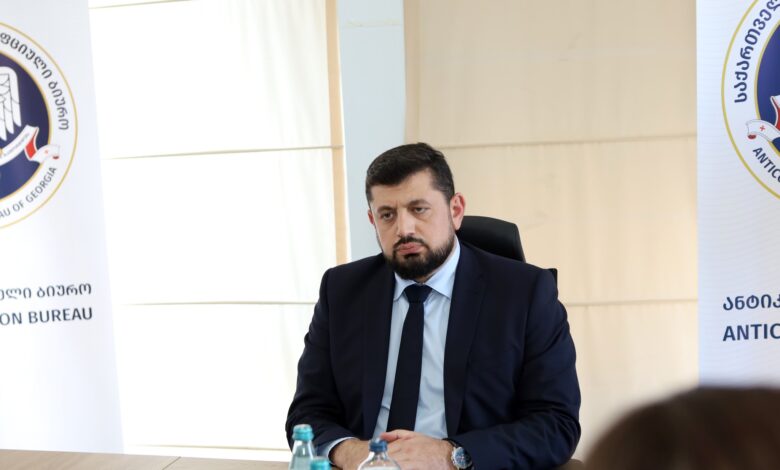
Two More Organizations Report Being Inspected by Anti-Corruption Bureau
Two more civil society organizations, the Social Justice Center and the Media Development Foundation, said they received court orders issued at the request of the Anti-Corruption Bureau, demanding that they hand over sensitive information, including confidential data about their beneficiaries.
Previously, on June 18, the Bureau targeted Transparency International Georgia, Sapari, the Civil Society Foundation, the Economic Policy Research Center, and Georgia’s Future Academy with the same request.
“The requested information is unbelievably broad and would effectively place our work under total government control,” the Social Justice Center (SJC), a Georgian human rights group, said on June 19. “It also covers personal data of beneficiaries, organizational correspondence and letters, which amounts to a blatant and unlawful interference in our advocacy and human rights defense work,” the group added, vowing not to disclose sensitive data and to appeal the court order.
One such order, sent to another CSO and seen by Civil.ge, requests the names, surnames, and ID numbers of individuals, including beneficiaries, involved in the organization’s planned or completed activities, along with larger legal, technical, and financial data for the period from January 1, 2024, to June 10, 2025.
The requests in the court order contradict claims by Razhden Kuprashvili, head of the Anti-Corruption Bureau, a public agency, who vowed that professional and personal confidentiality would be “fully protected.” Kuprashvili argued inspections are in line with the law and aimed “solely at examining the purposes of organizations that receive grants or engage in political activities.”
“Our work will aim to expose those organizations whose activities do not match their declared goals and that are secretly engaged in political activities,” Kuprashvili said at a June 18 briefing, after the CSOs raised alarm over demands for information about their beneficiaries.
Bureau’s Motions Cite Election Projects, Public Speeches
Representatives of some of the affected CSOs said the Bureau’s requests to the courts cited a broad range of activities of the organizations as reasons behind the inspection, from get-out-the-vote campaigns to speeches by the CSO heads.
“So, as per the Bureau’s implicit position, both election observation and promoting of participation are viewed as politically dangerous activities that warrant excessive scrutiny, with those conducting them subjected to additional requirements,” said Saba Brachveli, a lawyer from the Civil Society Foundation.
TI Georgia said the Bureau’s court action against it was prompted, among other things, by a speech by Director Eka Gigauri at the European Parliament, where she voiced support for detained protesters in Georgia and called for sanctions against the GD government members. Gigauri added that the Bureau’s court motions also cited TI-Georgia’s work providing free legal aid to citizens, their criticism of the GD government’s “draconian” laws, and related activities.
“Everything we do irritates them, especially that we help Georgian citizens and that we fight for Georgia’s European future,” Gigauri said.
Sapari said the Bureau cited Facebook posts in its case, including the organization’s anti-child marriage message for World Children’s Day, a call to fundraise for people fined during protests, staff participation in the Women’s March on March 8, and involvement in the nationwide strike on January 15.
The Anti-Corruption Bureau’s court motions cite four laws – the Law on Combating Corruption, the Law on Political Associations, the Law on Grants, and the Foreign Agents Registration Act (FARA) – to check the organizations’ compliance. The court orders, however, omit FARA, granting the Bureau inspection rights only under the three other laws.
“All three bases are irrelevant, unfounded, and illegal,” the Social Justice Center said in a larger legal analysis of their cases.
The specific provision from the Law on Combating Corruption cited in the court orders grants the Anti-Corruption Bureau the right to request information from individuals and legal entities to investigate corruption in public service, not civil society organizations, the SJC noted.
The legal provision cited from the Law on Political Associations pertains to financial monitoring of electoral entities or individuals with declared electoral goals, which the SJC says does not apply to civil society organizations.
The last basis for inspection is a recently amended provision in the country’s Law on Grants, which authorizes the bureau to monitor “forbidden” grants given without government approval. The SJC noted the amendments took effect April 17, 2025, and apply only to grants issued after that date, while the court-ordered inspection covers the period starting January 1, 2024.
“Both the motions submitted by the Anti-Corruption Bureau and the court orders issued on their basis rest on fragile legal grounds and establish arbitrary conditions for unlawful interference and control over the internal autonomy of civil society organizations,” the SJC said, adding, “The obligation to disclose information concerning beneficiaries and third parties will have a severe chilling effect on these organizations, undermining public trust in human rights actors and paralyzing their capacity to operate effectively.”
Amnesty International, the international human rights watchdog, also responded to the targeting of CSOs, describing the move as the authorities’ “escalating repression” of freedom of expression and association in the country, and the “weaponization” of the justice system through the Anti-Corruption Bureau and the crackdown on human rights defenders.
“Targeting those who fight for justice and combat corruption is contrary to Georgia’s international human rights obligations, including the rights to freedom of expression and association,” the organization said.
NOTE: This article was updated on June 20 at 18:05 to include statements from Sapari and Amnesty International.
Also Read:
- 31/05/2025 – Georgian Dream’s FARA Takes Effect
- 02/10/2024: Anti-Corruption Bureau Drops TI-Georgia’s “Political Actor” Status at PM’s Request
This post is also available in: ქართული